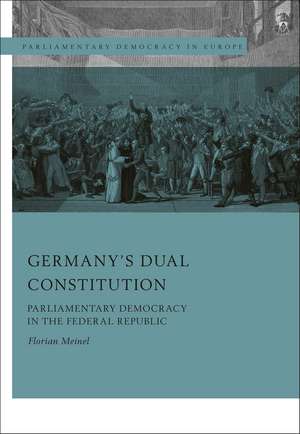Germany’s Dual Constitution: Parliamentary Democracy in the Federal Republic: Parliamentary Democracy in Europe
Autor Florian Meinelen Limba Engleză Paperback – 25 ian 2023
| Toate formatele și edițiile | Preț | Express |
|---|---|---|
| Paperback (1) | 235.54 lei 6-8 săpt. | |
| Bloomsbury Publishing – 25 ian 2023 | 235.54 lei 6-8 săpt. | |
| Hardback (1) | 374.01 lei 3-5 săpt. | +24.97 lei 7-11 zile |
| Bloomsbury Publishing – 14 iul 2021 | 374.01 lei 3-5 săpt. | +24.97 lei 7-11 zile |
Preț: 235.54 lei
Preț vechi: 304.59 lei
-23% Nou
Puncte Express: 353
Preț estimativ în valută:
45.07€ • 47.27$ • 37.52£
45.07€ • 47.27$ • 37.52£
Carte tipărită la comandă
Livrare economică 01-15 aprilie
Preluare comenzi: 021 569.72.76
Specificații
ISBN-13: 9781509943432
ISBN-10: 1509943439
Pagini: 152
Dimensiuni: 169 x 244 x 25 mm
Greutate: 0.25 kg
Editura: Bloomsbury Publishing
Colecția Hart Publishing
Seria Parliamentary Democracy in Europe
Locul publicării:London, United Kingdom
ISBN-10: 1509943439
Pagini: 152
Dimensiuni: 169 x 244 x 25 mm
Greutate: 0.25 kg
Editura: Bloomsbury Publishing
Colecția Hart Publishing
Seria Parliamentary Democracy in Europe
Locul publicării:London, United Kingdom
Caracteristici
Updated from the German original, it discusses all recent developments such as the impact of COVID-19
Notă biografică
Florian Meinel is Chair of Public Law and Philosophy of Law at the University of Würzburg, Germany.
Cuprins
1. Introduction: The Two Crises of Parliamentary Government I. Brexit and the Europeanisation of Westminster Parliamentarianism II. Master Narratives of the German Democracy - and Recent Doubts III. Realities of Mass and Social Media IV. Outline 2. The Two Worlds of German Constitutionalism I. What is Parliamentary Government? A. The Monism of Powers B. Reservations about Parliamentary Rule C. Confidence, Power and Control D. The Asymmetric Juridification of the System of Government II. The Dual Structure of the German Constitution A. The Administration's Uncoupling from the Political System B. Continuity as Principle C. The Constitution as an Achievement III. The Outsider's Republic: Parliamentary Government and the Political Culture of the Merkel Era A. Technocracy or Morality? B. The Weakness of Parliamentary Instruments of Power C. The Drama of the Social Democrats IV. Merkel's Legacy and the Cautionary Tale of the Grand Coalition A. The Supermajority as Working Principle B. The Democratic Costs of the Multi-Party System C. The Future of the Constitution V. Parliamentarianism and Anti-Parliamentarianism 3. Transformations of Parliamentary Government in Germany Since World War I I. The Written and the Real Constitution A. A Constitution without a Theory B. The Link between Parliament and Government II. 1919: Weimar - A Semi-Parliamentary Bureaucracy A. The Very Different Example of England B. The German Problem C. Organising Responsibility D. Distorted Images in Parliamentary Theory: A Weimar Legacy III. 1949: Parliamentarianism and the Basic Law A. The Point of Departure B. A Turn Away from the Parliamentary System of Government? C. The House that Adenauer Built (With a Little Help from the SPD) D. The Federal Chancellery as Parliamentary Government Headquarters E. The Chancellor's De Facto Right to Dissolve Parliament IV. 1969: The Normality of Parliamentary Changes of Power and the 'Popular Parties' as Mediating Institutions A. Parliamentary State Secretaries: Their Uses and Abuses B. In Praise of Party PatronageV. The Legal Connection between Parliament and Government Forged by the Constitutional Court A. Limits of Constitutional Review in Parliamentary Democracies B. A Political Court C. The Constitutional Enabling of Parliamentary Minorities and of the Parties D. The Reservation of Statutory Powers and its Democratic Reinterpretation E. Parliament as an Agency of Legalisation and a Machine of Legislation 4. What is the Bundestag? Political Representation in a Working Legislature I. What is Parliamentary Representation? A. Representation without Decision? B. Constitutional Problems of Representation II. The Constitutional Importance of the Electoral System A. Is there a Democratic Precedence of Proportional Representation? B. The Political Consequences C. The Eternal Question of Electoral ReformIII. The Tasks of Political Theory 5. The Crisis of the Mediating Institutions I. The Abiding Peculiarity of Parliamentary Government in the Federal RepublicII. The Creeping Decline of the Popular Parties as a Constitutional Factor A. The Limits of Culturalist Explanations B. In Praise of Lobbyism, or: The End of West German Corporatism C. There are No Small Parties Any More D. At the Borders of Government and Opposition E. Forming Governments I: Why do Coalition Talks Take Longer and LongerF. Forming Governments II: Intervals of the Political System G. Forming Governments III: The Latency of the Presidential Factor III. The Dilemma of the Federal Constitutional Court A. The Temptations of the Grand Coalition B. Europe and the Difficulties of Bringing Back in Parliament C. Formalising the Informal: A Juridical Dilemma IV. The Chancellery Unchained A. What Matters when it's a Matter for the Boss B. The Creeping Unitarisation of the Executive 6. Potentials and Weaknesses of Parliamentary Control I. What is Parliamentary Scrutiny? A. Trust and Scrutiny B. The Dialectic of Ministerial ResponsibilityC. Who is the Federal Government? or: The Object of Scrutiny II. Functions and Limits of Plenary Control A. Questions of Style, Rules of Procedure B. The Lack of Rhetorical Culture C. The Complicity of the Opposition III. In the Engine Room of Responsibility: The Committees A. The Masterstroke of the 1969 Parliamentary Reform B. Politics and Bureaucracy in the Committees IV. The Multi-Level System, Information Overkill and NewAdministrative Models - Aspects of Unbounded Control Tasks A. How to Control 'Europe'? B. Scrutiny or Executive Self-Control? A Passive Parliament C. The Rise of Agencies and the Limits of Inquiry Rights D. Government Scrutiny by Corporate Governance: An Unconstitutional Fallacy 7. The Future of Parliamentarianism and the German Constitution I. What Chances for Minority Governments? II. A New Chance for a Bargaining Democracy?III. A Renaissance of Parliamentarianism? IV. Constitutional Implications V. Institutional Alternatives









